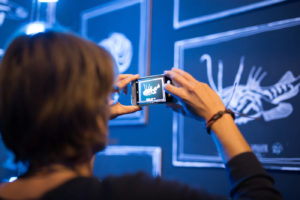The innovative and critical potential of artistic research lies in its capacity to generate personally situated knowledge, implying that ideas and theory are ultimately the result of practice, and that the emergent process of research methods unfolds through practice. Based on the notion that knowledge is derived from doing and the senses, this ACMlab hands-on workshop led by Maren Richter and Dr Adnan Hadzi will explore collaboration in artistic research and curatorial practice.
Workshop participants will have the opportunity to discuss the necessity of design for such projects from the point of view of the artist engaged in industry partnerships and projects. Whether you are the curious artist who is interested in testing out productive gaps in your practice or thinking of applying for the next call of the Malta Arts Fund – Research Support Grant, this may be the session for you.
This ACMlab is being organized in collaboration with the Department of Digital Arts at the Faculty of Media & Knowledge Sciences, University of Malta.

Maren Richter
Maren Richter is a curator and researcher. She defines her curatorial practice as one that creates space for exchange with, for and on experimental artistic practice based on the production and politics of space and alternative knowledge production. Between 2016 and 2018 she was the curator of the main visual arts exhibition in the Valletta 2018 Cultural Programme. She is the co-initiator of ‘Grammar of Urgencies’ a research-based series of collaborative projects, initiated in 2015. In 2013 she co-curated the first Maldives Pavilion at the 55th Venice Bienniale, which was designed as an ‘eco-aesthetical’ space for international exchange of artists, theorists, campaigners and researchers. Between 2010 and 2013 she was the artistic director of the Regionale, a festival in Styria/Austria, which looked into the question of how rural areas and landscapes could become a model for a new socio-political discourse in times of urban growth and climate change. She was curator at Camouflage Art/Culture/Politics in Johannesburg and at CCASA in Brussels, and the co-curator of a series of researches and exhibition on alternative and informal life between 2003 and 2006 (amongst others “Naked Life” at MOCA Taipei).

Dr Adnan Hadzi
Adnan Hadzi is currently working as resident academic in the Department of Digital Arts, at the Faculty of Media and Knowledge Sciences, University of Malta. Hadzi has been a regular at Deckspace Media Lab, for the last decade, a period over which he has developed his research at Goldsmiths, University of London, based on his work with Deptford.TV. It is a collaborative video editing service hosted in Deckspace’s racks, based on free and open source software, compiled into a unique suite of blog, cvs, film database and compositing tools. Hadzi is co-editing and producing the after.video video book, exploring video as theory, reflecting upon networked video, as it profoundly re-shapes medial patterns (Youtube, citizen journalism, video surveillance etc.). Hadzi’s documentary film work tracks artist pranksters The Yes Men and ! Mediengruppe Bitnik Collective – a collective of contemporary artists working on and with the Internet. Bitnik’s practice expands from the digital to affect physical spaces, often intentionally applying loss of control to challenge established structures and mechanisms.

